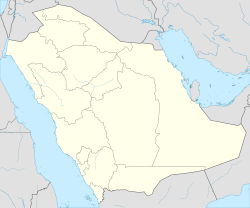Al Faj الفج | |
|---|---|
Village | |
| Coordinates: 21°59′00″N39°31′20″E / 21.98333°N 39.52222°E | |
| Country | |
| Province | Makkah Province |
| Time zone | UTC+3 (EAT) |
| • Summer (DST) | UTC+3 (EAT) |
Al Fazz is a village in Makkah Province, in western Saudi Arabia. [1]
Al Faj الفج | |
|---|---|
Village | |
| Coordinates: 21°59′00″N39°31′20″E / 21.98333°N 39.52222°E / 21.98333; 39.52222 | |
| Country | |
| Province | Makkah Province |
| Time zone | UTC+3 (EAT) |
| • Summer (DST) | UTC+3 (EAT) |
Al Fazz is a village in Makkah Province, in western Saudi Arabia. [1]
| 1,000,000 and more | |
|---|---|
| 300,000-999,999 | |
| <300,000 | |
Source: cdsi.gov.sa | |
| | This article about the geography of Mecca Province is a stub. You can help Wikipedia by expanding it. |
